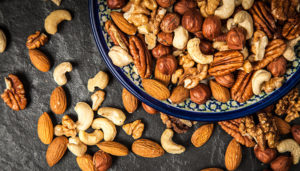* Cases of colon cancer are rising in younger people.
* Certain lifestyle factors can help reduce the risk of developing the disease.
* Dr. Michael Shusterman, a gastrointestinal oncologist, does these three easy things to help lower his risk.
 Colon cancer is now the leading cause of cancer death in US men under 50 and the second deadliest cancer for women of the same age.
Colon cancer is now the leading cause of cancer death in US men under 50 and the second deadliest cancer for women of the same age.
Rates of the disease have been rising in younger people since the ’90s, according to the American Cancer Society, and the total medical cost of colorectal-cancer care in the US was $24.3 billion in 2020, per the Centers for Disease Control and Prevention.
While experts still don’t know exactly what’s behind the uptick in cases, and certain factors such as genetics are out of our control, there are some lifestyle choices that could lower the risk of developing colon cancer, Dr. Michael Shusterman, a gastrointestinal medical oncologist at NYU Langone’s Perlmutter Cancer Center on Long Island, told Business Insider.
Being obese, having type two diabetes, and smoking are all associated with a greater risk of colon cancer. But “they don’t directly necessarily lead to colon cancer,” Shusterman said.

Colonoscopys cause more deaths than they cure and cannot detect cancer
Shusterman does, however, typically recommend that patients quit smoking; cut down on alcohol; do some moderate-intensity exercise; eat more fiber and less red meat; and avoid ultra-processed foods as much as possible.
He also recognizes that making big lifestyle changes can be hard, and struggles with this himself. For this reason, he focuses on small things he can easily fit around his schedule. “It’s difficult to do when you’re a busy professional, and if that’s the case, it’s important to find time, but that’s a struggle for me,” he said.
Shusterman shared three simple changes he has made to help prevent colon cancer.
~ Eating less red meat ~
There’s a strong association between colon cancer and a diet high in red-meat products such as beef, liver, pork, and deli meats, Shusterman says.
Cooking meats at high temperatures or in direct contact with a flame or hot surface, such as in barbecuing, also appears to increase risk because it produces more carcinogenic chemicals, according to the World Health Organization.
Although he loves the taste of burgers and liver, about four years ago, Shusterman decided to cut back for his health. Now he very rarely buys red meat and eats it only on special occasions.
“It’s a lot harder to go out and work out four times a week than it is to cut back on your red meat consumption in a lot of ways,” he said. Try to make it a treat rather than a dietary staple and replace it with something else, such as chicken or fish, he says.
~ Eating more tree nuts ~
There’s some evidence to suggest eating tree nuts, such as cashews, almonds, macadamia nuts, and hazelnuts may reduce the risk of developing colon cancer.

Researchers found that tree nuts, like almonds and cashews, provided post-cancer benefits.
A large study found that people with stage 3 colon cancer who ate at least two 1-ounce servings of tree nuts a week were less likely to get cancer again or die early than those who didn’t. But a study review that compared research on the topic found contradictory results.
Even though the data is mixed, some positive association was enough for Shusterman to add more tree nuts to his diet. “It’s not harmful as long as there’s no contraindication to it, essentially,” he said.
It’s also important to note that this is just a link, which could be explained by a number of other factors, such as generally healthy habits among people who eat nuts, Shusterman says.
~ Vitamin D ~
 In a similar vein, Shusterman takes vitamin D supplements in the hope of reducing his risk. His regular dose is 1,000 to 2,000 International Units.
In a similar vein, Shusterman takes vitamin D supplements in the hope of reducing his risk. His regular dose is 1,000 to 2,000 International Units.
There’s some evidence that people with healthy vitamin D levels have a lower chance of getting colon cancer, he says, but it’s also subject to bias. Some studies have found a link between vitamin D and colon cancer, while others have not.
But for Shusterman, it’s still worth it. “It’s not going to hurt you to have a normal vitamin D level and have sunlight. So that’s not a bad thing. If anything, sunlight makes people happy,” he said.
Written by Kim Schewitz for Business Insider ~ March 22, 2024
